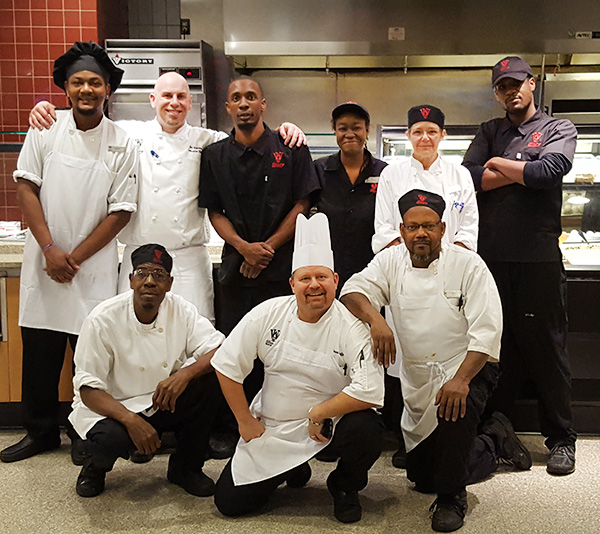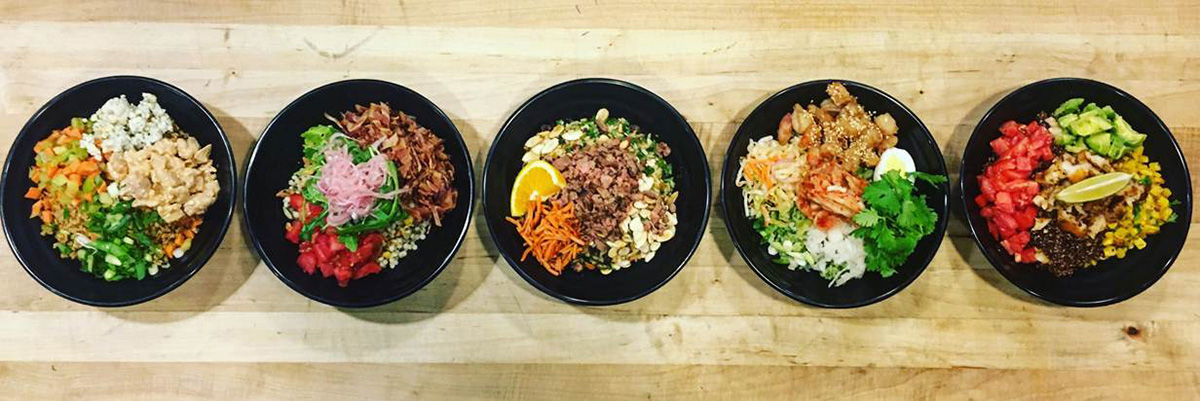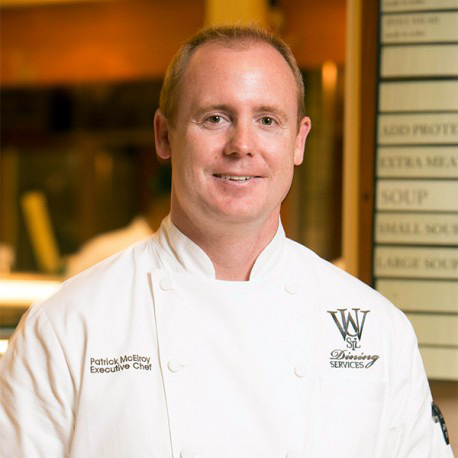Wear Good Walking Shoes: Secrets of Best Campus Food from Bon Appétit’s Executive Chef at Wash U (No. 3)
Washington University in St. Louis’s main Danforth campus is surrounded by beautiful tree-lined suburban streets that lead the way to the city’s cherished museums, vibrant dining scene, and performing arts venues. With more than 12,900 full-time students who travel from all over the world to wear WashU Bear colors, the phrase “it takes a village to raise [or feed] a family” comes to mind, as Washington University is certainly a large one. Although on a sizable campus, dining at WashU runs like a well-oiled, lean, mean, and (very) green machine — from the Bon Appétit team’s continuous sustainability initiatives to their highly acclaimed food.
The Princeton Review, one of the best-known college ranking institutions, tabulates surveys from more than 137,000 students across the country annually (see methodology) on a variety of metrics. It recently announced that Washington University jumped to No. 3 for Best Campus Food for the 2018 list.
Patrick McElroy has been Bon Appétit’s executive chef at WashU since 2010. Recently we asked him to share what goes into making America’s Best Campus Food.
It helps to have a good mix.
It really comes down to the team as a whole. We have a solid program, we have a great partnership in our university that provides us the equipment and resources we need, and we have fantastic people. Every single person is an integral part of the success here; it’s the chefs with the culinary knowledge, it’s our fantastic marketing team, it’s our team of associates who have the passion and who care, it’s our team of management that helps us achieve our goals. It’s the whole package.
Be culinarily omnivorous.
One of the things that really helps our food stay connected to the student body is that we have chefs with such diverse backgrounds (a total of about 17 or 18 on campus). Each have their own experiences and histories that enrich our perspective when it comes to menu creation. We also draw on the menuing creativity of our hundreds of culinary team members; every one of them brings a story to the table, too. It’s a great learning environment. Being creative and pushing the envelope when it comes to flavor is important to us. If your mom’s meatloaf is the best thing you ever had, we want to make it!
Engage in the learning process.
We put a lot of thought behind providing menu items that are going to be sustainable and well received by a fair portion of our guests, whether it’s tapas or grain bowls. Our students are always challenging us in a positive way and encouraging our chefs to think outside the box, be inventive, and be authentic. This relationship ultimately drives our program. For example, it led to our involvement with Native American cuisine. The idea originally came from a few undergrad students. From there, we connected with WashU’s Native American cultural center, and it soon blossomed into a full-fledged program on campus. Nephi Craig, founder of the Native American Culinary Association, gives us direction and guidance.

Some of WashU’s award-winning team, front row: Cook Demetrius Butler, S40 Café Manager Shawn Coffel, and Cook Marvin Wingo. Back row: Cook Cartell Saffold, S40 Executive Chef Joesph Graves, Utility Worker Daveon Lee, Cashier Lillie Westbrooks, Cook Tammy Milliken, and Utility Worker Franklin Collins.
As I’ve become more involved in Native cuisine, I’ve come to learn that specific ingredients carry different philosophical or religious meanings, I’ve enjoyed learning the reasoning behind why certain foods are used in other different cultures. For me, understanding food at a deeper level and engaging in this kind of education has been very rewarding and has served as an incredible influence.
Learn to be everywhere.
Get some good walking shoes. It’s a big campus, and there’s a lot of moving parts. Becoming disengaged can be easy in such a large operation — 350 associates, 32 managers — it’s a big old ship, man! We’re open 22 hours a day, seven days a week, so it can be difficult for our team to find time to connect. Organization and time management are imperative, and stopping by to say hello to the team, helping out to grill some burgers…it makes that difference.
The kitchen heat is no match for a good mantra.
The complexity and magnitude of this operation can be overwhelming, but we know how to pull somebody away, recognize that maybe it’s time to take a breather. Everybody has their own little thing when it comes to managing stress. My personal sort of mantra is a Latin phrase meaning “upon one accord.” The idea is that you are either successful because you allow yourself to be successful, or you fail because you allow yourself to fail. With this is mind, I push myself and my team to be successful. When the team shares that same focus and motivation, the energy is different. We as a team pick each other up, carry each other, influence each other, and drive each other.
Offer something for everyone.
Our student dining committee is basically the ears and eyes of the student body — they keep us on our toes and help us know where to make positive change and what to keep providing. Something we’ve found to be very valuable is having options — and boy, do we have options. You could easily find 100 to 150 different items to eat on campus. We change our menus seasonally, and we’re very engaged when it comes to ensuring nutritional information is available for our guests. We work with our local partners, ranchers, farmers, local craft people to ensure they have a strong influence on campus. We are mindful to add menu items for those seeking new and healthier meals. All of these things factor in when we talk about achieving our goals in the kitchen. And also, you know, What do we want to cook?
Stay connected with your community.
My favorite event — and most chaotic — are the same thing: commencement. It’s about 20,000 people, and what I really value about it is the camaraderie. We bring together all the teams from different campus kitchens and locations, and get to create an outstanding amount of food side by side with the people we don’t normally get to work with. The team energy is so positive and enthusiastic — everyone is so happy for the graduates. It’s a different connection when you work with students, because you’ve seen them and cooked for them every day for that last four to five years. When they graduate, it’s like a part of you is graduating, too, and that’s an incredible celebration to be a part of.

